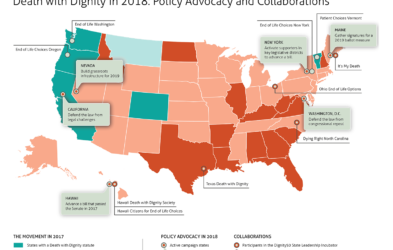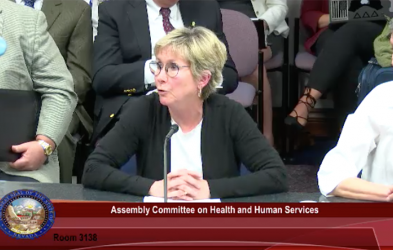
End of Life Choices New York Works Toward Policy Reform in the Empire State
Our partner organization, End of Life Choices New York (EOLCNY) is one of the oldest state-based Death with Dignity organizations in the country. For the past 18 years, EOLCNY staff and volunteers have…

On the Verge of History: Hawaii Senate Passes Death with Dignity Bill
The Hawai‘i State Senate today voted to pass a Death with Dignity bill. The bill now heads to Governor Ige who has expressed support and said he would be proud and honored to sign it. We are now one signature away from Hawai‘i becoming the nation's seventh jurisdiction with a Death with Dignity statute.

Hawaii House of Representatives Passes Death with Dignity Bill
Great news from the Aloha State! On March 6, the Hawai‘i House of Representatives passed HB 2739, Our Care Our Choice Act, a Death with Dignity bill. The 39-12 final vote not only reflects the views of the people of Hawai‘i, it makes the nation's seventh Death with Dignity law a distinct possibility.

Death with Dignity-Albany Campaigns for Policy Reform in New York
For the fourth consecutive year, the New York State Legislature will consider a Death with Dignity bill. Bonnie Edelstein, the executive director of Death with Dignity-Albany, has been on the front lines of the grassroots campaign for end-of-life policy reform in New York. We spoke with Bonnie about the year ahead and the unique opportunities and challenges of grassroots organizing in New York.

Toward the Tipping Point: Death with Dignity in 2018
Though some state legislatures are not in session in 2018, we are gearing up for a very busy year. We are excited about the breadth and depth of our work in states across the country, and truly inspired by our…

The Final Battle in Washington, D.C.
Earlier this year, the House of Representatives passed a spending bill that would repeal Washington, D.C.’s newly passed Death with Dignity Act. We worked hard to keep that awful provision out of the Senate’s companion bill—and we succeeded.

Come Hell or High Water: Valerie Lovelace on Advocating for Death with Dignity in Maine
Val Lovelace believes that all individuals deserve the chance to have a peaceful, humane death that accords with their wishes and values. To start a conversation in her home state of Maine, she founded It’s My Death, a nonprofit dedicated to “providing services and education to people who wish to actively explore the meaning of life through embracing the certainty of death.”

The March to Dignity: One Year of Death with Dignity in California
Every week has been significant in the Death with Dignity movement lately. Milestone after milestone, we approach the day when all Americans will have a full range of end-of-life options.

Human Right and Dignity: Testimony in Support of Nevada SB 261
I truly hope that you consider allowing the diverse residents of the state of Nevada this human right and dignity. Most of your constituents will not choose it, but those who do, and their families, will thank you forever.

A Series of Safeguards: Testimony in Support of Nevada SB 261
Throughout SB 261, just as every state has done, you will see a series of safeguards and a well-defined process to protect the patient, the health care professional, and the family—all designed to ensure that the patient is in control, acting voluntarily and able to make their own health care decisions.